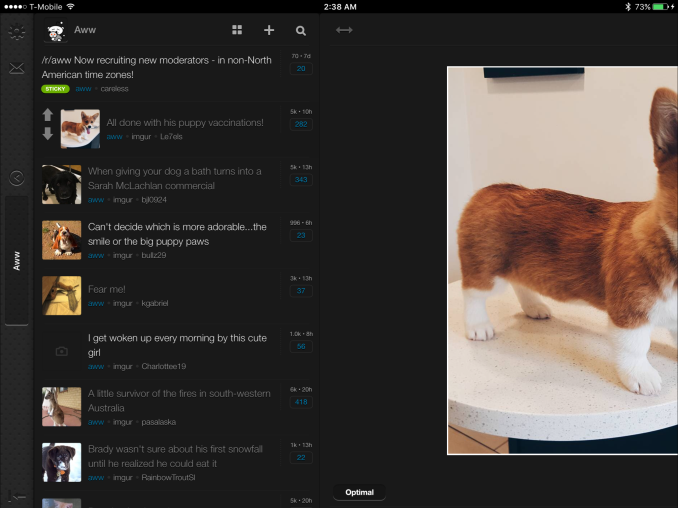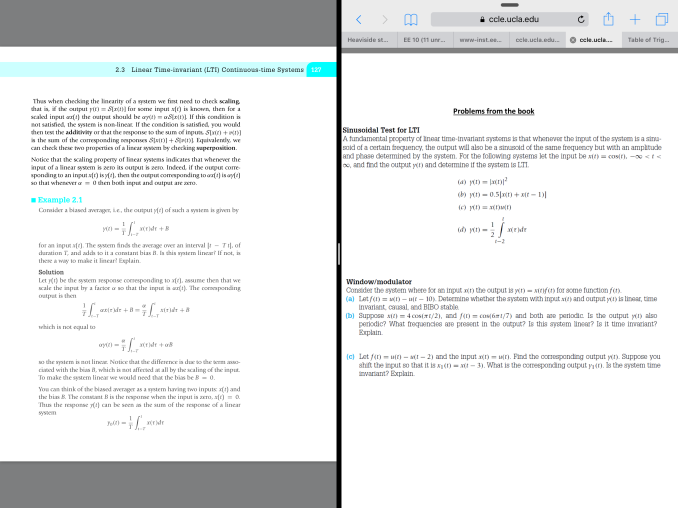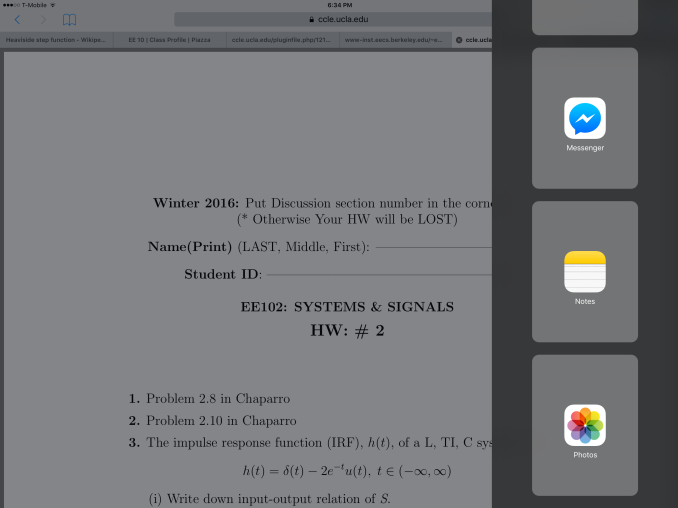The Apple iPad Pro Review
by Ryan Smith, Joshua Ho & Brandon Chester on January 22, 2016 8:10 AM ESTSoftware UX
For those that are unfamiliar with our other articles, we reviewed iOS 9 at its release back in September. If you aren’t familiar with what has changed in the move from iOS 8 to iOS 9 I highly recommend reading it as for the most part I have nothing new to say in the context of what was covered in that review. Instead of treading old ground, it’s worth discussing the specific aspects of the user experience that are unique to the iPad Pro.
The first, and perhaps most obvious change is the display size and resolution. While the aspect ratio is the same as the iPad Air, the significantly increased display size and resolution also affects applications. For the most part I haven’t noticed any issues here. However, in some cases there are still applications that haven’t been properly redesigned for the larger display, so they end up simply being purely upscaled versions of applications designed to fit 7.9 and 9.7 inch displays. This tends to look fairly ugly in my opinion but it does work without issue when dealing with backwards compatibility.
In cases where applications are updated to fit the iPad Pro, designs are generally well-executed and take advantage of the additional screen real estate. It’s probably not a surprise to know that most applications fall under this category, but it’s worth mentioning at any rate.
The larger display size also greatly enhances the utility of split-screen multitasking on the iPad Pro, as it’s generally quite useful to be able to run two almost iPad Air-sized apps simultaneously on the iPad Pro. As discussed in the Apple Pencil section of this review, being able to read a PDF and take notes/do problem sets based upon a document opened in Safari is incredibly useful and helps with productivity. There are other applications here to be sure, but I think an education setting was where I found the most value. However, it's worth mentioning that the multitasking UI feels like it isn't really designed for a future where hundreds of applications will occupy the slide-out multitasking menu.
For the most part, iOS is smooth and performant on the iPad Pro. However, there are a few notable cases where I did notice frame drops. For whatever reason, this seems to be basically limited to the Notes application. It seems that as time has gone on it has become increasingly difficult for anyone shipping a mobile OS to make everything smooth all the time, likely a product of their increasing complexity and larger code base.
Overall, I don't have as much to say here. When the only two competing tablet operating systems worth discussing in comparison to iOS are either neglected (Android) or heavily reliant upon legacy applications that really need a mouse and keyboard to be used properly (Windows), iOS stands alone as basically the only touchscreen OS worth using. I don't think the solution to the problem of the keyboard with the iPad Pro means that it needs a touchpad, nor should using both keyboard and touch simultaneously in the deployed mode be the dominant method of interaction. Trying to do the former is basically just emulating a really terrible laptop, while the latter makes for poor ergonomics almost universally.
While it may be appealing to make a tablet that is also a laptop due to the nature of legacy Windows applications, trying to make such a convergence device is a great way to make either a compromised laptop or a compromised tablet. The other half of the functionality is almost never going to be used in practice if my experiences with Surface Pro are anything to go by. Android showed arguably even more promise than iOS as a tablet OS due to its more traditional computer than appliance OS structure, for whatever reason the promise that came with the structure of Android didn't pan out in execution.
As a result, the iPad line stands alone in software, for better or for worse.













408 Comments
View All Comments
ddriver - Sunday, January 24, 2016 - link
Bing is a professional application for every professional lamer. To the latter, the ipad "pro" is a professional product too.ddriver - Sunday, January 24, 2016 - link
LOL At most 2 or 3 of those could qualify for "professional" if one is inclined to be generous with the labels.Professional applications - photoshop, 3d max, maya, solidworks, coreldraw, indesign, visual studio, cubase, pro tools, after effects, fusion, z-brush, and so on.
10101010 - Friday, January 22, 2016 - link
Yeah, I'm sure that's why the combined "hammer + screwdriver" tool market is just booming.ddriver - Friday, January 22, 2016 - link
Yeah, I am sure making good analogies is not your strong point.A more appropriate analogy would be those screwdriver kits with a single handle and interchangeable tips, saving you the effort to carry around 20 different screwdrivers, and those kits are GREAT ;)
But we aren't talking just any hardware here, we are talking computers, and general purpose at that, this is not the case of some special purpose hardware. This is a general purpose computer, and what it does is defined entirely by its software. Absent any software, it is just a paper weight, or a serving tray, absent professional software it is just a toy, intended to milk people out of their money.
lmcd - Tuesday, February 9, 2016 - link
I mean, a lot of the times they are bought in bundles ;)abazigal - Friday, January 22, 2016 - link
Possibly because there isn't a hybrid that is as good as a dedicated laptop and a dedicated tablet. You are essentially trading one set of compromises for another, and people's mileage will vary.ddriver - Friday, January 22, 2016 - link
So a "hybrid" being 10% heavier and 10% thicker than a tablet, and 10% slower than a laptop justifies buying and carrying a tablet and a laptop instead of a hybrid?Obviously, a hybrid will be a little slower than a laptop and a little heavier than a tablet, but in many cases that is not detrimental. People should have the option to use their devices to the full extent of their capabilities, and whoever needs the extra horsepower will buy a laptop or even a desktop system instead.
I really don't understand how come people have such a big problem with maximizing a device capability and productivity? IN what way will the availability of professional software for iOS hurt you?
10101010 - Saturday, January 23, 2016 - link
I just don't see a "hybrid" being defined primarily by size, weight, or speed. If we look at a hybrid such as the "Surface Pro", it is defined mostly by its Windows 10 operating system. This is an insecure loaded-with-spyware-at-the-factory desktop OS that pretends to be a tablet OS, laptop OS, server OS, phone OS, etc. There are really no great Windows apps made specifically for a tablet (although a few work nicely with a pen/stylus). So at the end of the day what is a Surface Pro "hybrid" really? It is a desktop OS and a keyboardless laptop. It's marketed as "best of both" but really it is a Frankenstein computer made of parts that Microsoft sawed off other products.Contrast Microsoft's Frankenstein with the iPad Pro -- a tablet built to be a tablet that runs what is widely regarded as the most stable, secure, and highest quality mobile OS. And delivers the closest thing yet to "paper and pencil" functionality to the market. Your point about the professional software is right on. As the apps evolve for the iPad Pro and more professional apps become available, it will only expand what an iPad Pro can be used for, opening the tablet up to being useful for more customers.
ddriver - Saturday, January 23, 2016 - link
I am sure iOS is spying on users as much as Windows 10, after all, M$ was largely inspired by Apple in this regard. And unlike W10, you can't really disable it in iOS.Unfortunately, the lack of professional applications, whose UI is usable on a tablet is true, be those windows, android or ios tablets. I do acknowledge that the only reason windows tablets have the upper hand is they can run the good old legacy professional software, which is a pain in the ass to use without a mouse and keyboard.
It would seem that the industry is rather unimaginative, they keep releasing new versions of their professional products, but don't adopt a better paradigm for user interaction, one that would work equally well on a traditional desktop PC and a tablet. Software giants are just as lazy and unimaginative as hardware giants.
And it is not like it is impossible, it is well within the realm of possibility to adapt the UI for wider device usage without impairing productivity, if anything, a more clever design will make application interaction easier, a lot of the professional app UIs are a pain to work with, even with a mouse, and practically impossible to use with a touch device.
One of the projects I am currently working on is a graphical programming language / IDE, capable of producing commercial grade software, and it is equally useful on a desktop with mouse and keyboard and on a tablet or even on a phone with touch. It is 2-3 months away from public release, unfortunately due to apple's policies, I will not be publishing to their store, since they don't really allow the degree of freedom an application development tool requires. It will still be available for jail broken apple hardware.
Constructor - Saturday, January 23, 2016 - link
I am sure iOS is spying on users as much as Windows 10, after all, M$ was largely inspired by Apple in this regard. And unlike W10, you can't really disable it in iOS.That is just nonsense. Apple is very careful about looking at user data, and in fact they credibly follow the tenet "the less of your information we look at, the better!".
That is not how Microsoft is proceeding with Windows 10 – there they seem to go more the Google route.